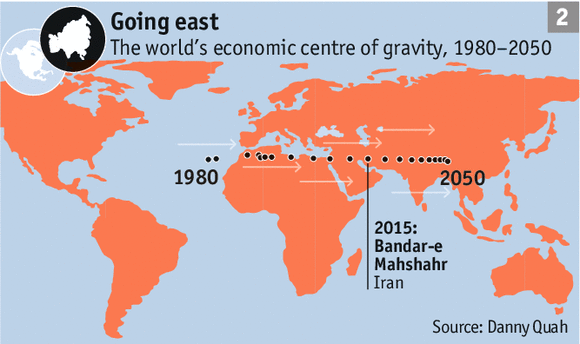A whistlestop tour of a year of eye-catching statistical landmarks
The way people think about the world will undergo a radical change in 2015, as assumptions that have held steady for years are overturned. In the economy and technology, especially, the year will bring a series of statistical landmarks.

The most remarkable shifts are geo-economic. America will overtake Saudi Arabia to become the world’s largest producer of oil, thanks to the shale-gas revolution (chart 1). Many aspects of international relations are built around American access to oil, and these will be viewed in a new light. The International Energy Agency forecasts that America’s oil pre-eminence will last until 2050 and beyond.

Yet Asia is still rising, and some striking numbers will reflect this. The combined wealth of Asian high-net-worth individuals (those holding at least $1m) will exceed those from North America in 2015, according to Capgemini and rbc Wealth Management. Danny Quah of the London School of Economics has calculated the world’s economic centre of gravity and reckons that, thanks to Asia’s rise, over the 70 years from 1980 to 2050 it will move eastwards from the mid-Atlantic all the way to somewhere between India and China. By 2015, the halfway point on this great journey, it will have reached the city of Bandar-e Mahshahr, in Iran, on the north-eastern tip of the Persian Gulf (chart 2).

China will pass two milestones. First, the country’s outward foreign direct investment is likely to exceed its inward flows (chart 3). This powerfully symbolises the degree to which China has matured as a global economic power. Second, China will for the first time in modern history begin the year as the world’s largest economy, surpassing America, at least in terms of purchasing-power parity (chart 4). Though quibblers will say it is an imperfect measure, it nevertheless suggests that, as Dryden put it, “An old age is out/And time to begin a new.”


After wealth follows power. Defence spending in the Asia-Pacific region, excluding China, will match the European Union’s spending in 2015, according to ihs Jane’s, a research firm (chart 5).

Technology is forever in flux. In 2015, sales of tablets will overtake those of personal computers (chart 6). Revenue from internet advertisements in America will surpass the combined value of ads from newspapers, magazines and billboards (chart 7). And, oddly, mobile-phone subscriptions will exceed the world population (chart 8): some people hold many accounts, especially in countries with spotty connections.


In 2015 there will be more people active on Facebook than living in China (chart 9). If the social network were a country, it would be the world’s most-populous.

One 2015 milestone reflects continuity rather than change. Health and inclination permitting, Queen Elizabeth II will become England’s longest-serving monarch on September 11th (chart 10), when she passes her great-great grandmother, Queen Victoria.







